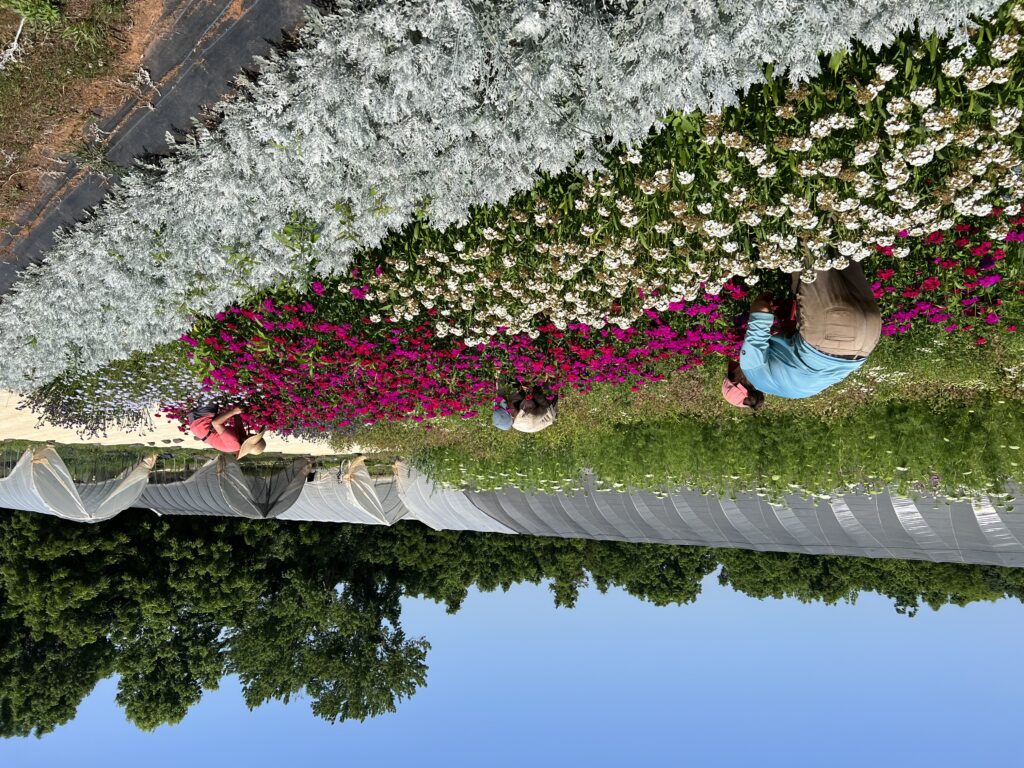Planning With Agriculture in Mind: A Conversation With Mike Ortosky
go.ncsu.edu/readext?1013234
en Español / em Português
El inglés es el idioma de control de esta página. En la medida en que haya algún conflicto entre la traducción al inglés y la traducción, el inglés prevalece.
Al hacer clic en el enlace de traducción se activa un servicio de traducción gratuito para convertir la página al español. Al igual que con cualquier traducción por Internet, la conversión no es sensible al contexto y puede que no traduzca el texto en su significado original. NC State Extension no garantiza la exactitud del texto traducido. Por favor, tenga en cuenta que algunas aplicaciones y/o servicios pueden no funcionar como se espera cuando se traducen.
Português
Inglês é o idioma de controle desta página. Na medida que haja algum conflito entre o texto original em Inglês e a tradução, o Inglês prevalece.
Ao clicar no link de tradução, um serviço gratuito de tradução será ativado para converter a página para o Português. Como em qualquer tradução pela internet, a conversão não é sensivel ao contexto e pode não ocorrer a tradução para o significado orginal. O serviço de Extensão da Carolina do Norte (NC State Extension) não garante a exatidão do texto traduzido. Por favor, observe que algumas funções ou serviços podem não funcionar como esperado após a tradução.
English
English is the controlling language of this page. To the extent there is any conflict between the English text and the translation, English controls.
Clicking on the translation link activates a free translation service to convert the page to Spanish. As with any Internet translation, the conversion is not context-sensitive and may not translate the text to its original meaning. NC State Extension does not guarantee the accuracy of the translated text. Please note that some applications and/or services may not function as expected when translated.
Collapse ▲ Mike Ortosky serves as the Community and Rural Development Agent for N.C. Cooperative Extension, Orange County Center and manages the W.C. Breeze Research and Education Incubator Farm. In addition to managing the incubator farm, his role includes working with existing and new landowners as they develop and expand agricultural enterprises, administer the Orange County Agricultural Economic Development Grant Program, regional food systems planning, and developing farmland protection policies. He serves on a number of committees to help meet the goals of his work including the TriCOGS Feeds Advisory Committee, the 2050 Comprehensive Land Use Plan Advisory Team including, and the Ag Preservation Advisory Board Subcommittee. He enjoys assisting clients with project funding, planning and technical assistance, and managing the Breeze Farm incubator projects.
Mike Ortosky serves as the Community and Rural Development Agent for N.C. Cooperative Extension, Orange County Center and manages the W.C. Breeze Research and Education Incubator Farm. In addition to managing the incubator farm, his role includes working with existing and new landowners as they develop and expand agricultural enterprises, administer the Orange County Agricultural Economic Development Grant Program, regional food systems planning, and developing farmland protection policies. He serves on a number of committees to help meet the goals of his work including the TriCOGS Feeds Advisory Committee, the 2050 Comprehensive Land Use Plan Advisory Team including, and the Ag Preservation Advisory Board Subcommittee. He enjoys assisting clients with project funding, planning and technical assistance, and managing the Breeze Farm incubator projects.
The Orange County local food landscape includes a variety of farming and food system operations as part of the Triangle urban area, which creates a robust market for local products while also very rural, creating a good opportunity for local production. Some of the challenges include high land prices and loss of farmland to suburban sprawl but Mike views that as an opportunity for advancement in regional food systems economy and planning for agriculture. It is also a great reason to support incubator farming.
An incubator farm program offers land, resources, and training to decrease barriers to early-career farmers and prepare them to start farming businesses. Owned by NC State University and managed part-time by Cooperative Extension personnel, the W.C. Breeze Research and Education Farm sits on one of the biggest plots of land of all NC incubators – 270 acres, donated to the NCSU Ag Foundation in 2004 by the Breeze Family. Mike manages the extensive maintenance efforts on the farm while also expanding infrastructure in order to support more incubator farmers. He also works to secure new funding sources as the farm currently operates on a very limited budget. New web presence and a promotional video are in development for additional education and funding opportunities.  An agrivoltaics project that will include a 1.5 – 2 acre solar installation for research into agronomic efforts such as soil moisture, temperature, carbon, and irrigation management is currently in planning stages, as well as demonstrating innovative solar infrastructure such as vertical bi-facial panels which facilitate farming operations. Agrivoltaics is defined by the Office of Energy Efficiency & Renewable Energy as, “agricultural production, such as crop or livestock production or pollinator habitats, underneath solar panels or adjacent to solar panels,” (Agrivoltaics: Solar and Agriculture Co-Location). All of the efforts at Breeze Farm support other programmatic initiatives regarding economics, technical data, management practices, and innovation.
An agrivoltaics project that will include a 1.5 – 2 acre solar installation for research into agronomic efforts such as soil moisture, temperature, carbon, and irrigation management is currently in planning stages, as well as demonstrating innovative solar infrastructure such as vertical bi-facial panels which facilitate farming operations. Agrivoltaics is defined by the Office of Energy Efficiency & Renewable Energy as, “agricultural production, such as crop or livestock production or pollinator habitats, underneath solar panels or adjacent to solar panels,” (Agrivoltaics: Solar and Agriculture Co-Location). All of the efforts at Breeze Farm support other programmatic initiatives regarding economics, technical data, management practices, and innovation.
“Incubator farms, as we know them today, are essential for development of experienced growers.” -Mike Ortosky
Mike shared that other agents wanting to work with incubator farms or farmers in their counties should establish diverse funding sources, develop strong infrastructure such as wells, irrigation, prep facilities, cold management, and comprehensive user agreements, promote on-site research opportunities, and expect significant maintenance needs. He shared that looking into the future of local foods and to move beyond direct sales like farmers markets and CSA’s, development of more robust value chains and more regionally-based food systems will be required. “There needs to be support for all scales of agriculture, from larger farms in rural areas to smaller operations nearer to, and within urban areas, proximity of farms and markets is essential. Incubator farms, as we know them today, are essential for development of experienced growers. Additionally, innovative methods for new growers to acquire land are needed such as financial assistance, buy-conserve-sell models, cooperative ownership, and farmland development (third party acquisition and development of farm parcels similar to residential development),” Mike said.
 Mike is one of several Extension agents who work directly with incubator farms. To support this work, NC FarmLink and the NC Local Food Program Team recently collaborated with NC farm incubators interviewing and touring the farms to better understand the structure, functioning, offerings, capacity for education, and general ability to exist as a solution in the land access puzzle for early-career farmers. A guide was created to share the findings and to help Extension agents learn how they can engage with incubators in their county. You can view the guide here.
Mike is one of several Extension agents who work directly with incubator farms. To support this work, NC FarmLink and the NC Local Food Program Team recently collaborated with NC farm incubators interviewing and touring the farms to better understand the structure, functioning, offerings, capacity for education, and general ability to exist as a solution in the land access puzzle for early-career farmers. A guide was created to share the findings and to help Extension agents learn how they can engage with incubators in their county. You can view the guide here.


